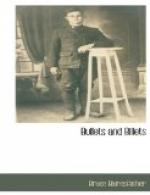Well, as I said before, we went “in” again on the 23rd. The weather had now become very fine and cold. The dawn of the 24th brought a perfectly still, cold, frosty day. The spirit of Christmas began to permeate us all; we tried to plot ways and means of making the next day, Christmas, different in some way to others. Invitations from one dug-out to another for sundry meals were beginning to circulate. Christmas Eve was, in the way of weather, everything that Christmas Eve should be.
I was billed to appear at a dug-out about a quarter of a mile to the left that evening to have rather a special thing in trench dinners—not quite so much bully and Maconochie about as usual. A bottle of red wine and a medley of tinned things from home deputized in their absence. The day had been entirely free from shelling, and somehow we all felt that the Boches, too, wanted to be quiet. There was a kind of an invisible, intangible feeling extending across the frozen swamp between the two lines, which said “This is Christmas Eve for both of us—something in common.”
About 10 p.m. I made my exit from the convivial dug-out on the left of our line and walked back to my own lair. On arriving at my own bit of trench I found several of the men standing about, and all very cheerful. There was a good bit of singing and talking going on, jokes and jibes on our curious Christmas Eve, as contrasted with any former one, were thick in the air. One of my men turned to me and said:
“You can ’ear ’em quite plain, sir!”
“Hear what?” I inquired.
“The Germans over there, sir; ’ear ’em singin’ and playin’ on a band or somethin’.”
I listened;—away out across the field, among the dark shadows beyond, I could hear the murmur of voices, and an occasional burst of some unintelligible song would come floating out on the frosty air. The singing seemed to be loudest and most distinct a bit to our right. I popped into my dug-out and found the platoon commander.
[Illustration: hayseed]
“Do you hear the Boches kicking up that racket over there?” I said.
“Yes,” he replied; “they’ve been at it some time!”
“Come on,” said I, “let’s go along the trench to the hedge there on the right—that’s the nearest point to them, over there.”
So we stumbled along our now hard, frosted ditch, and scrambling up on to the bank above, strode across the field to our next bit of trench on the right. Everyone was listening. An improvised Boche band was playing a precarious version of “Deutschland, Deutschland, uber Alles,” at the conclusion of which, some of our mouth-organ experts retaliated with snatches of ragtime songs and imitations of the German tune. Suddenly we heard a confused shouting from the other side. We all stopped to listen. The shout came again. A voice in the darkness shouted in English, with a strong German accent, “Come over here!” A ripple of mirth swept along our trench, followed by a rude outburst of mouth organs and laughter. Presently, in a lull, one of our sergeants repeated the request, “Come over here!”




